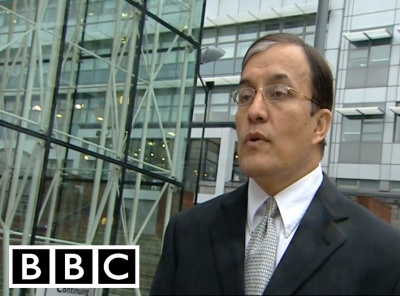
St. Mary's College of Maryland Professor Asif Dowla talks to BBC television in Glasgow, Scotland, about the global impact of the U.S. sub-prime loan crisis. (Photo courtesy SMCM)
ST. MARY'S CITY, Md. (March 5, 2008) - St. Mary's College Professor of Economics Asif Dowla traveled to Scotland recently to teach his "First World" audience a lesson in banking from an unexpected source-the developing world. His subject is one that is gaining support in global efforts to empower the world's poor-microcredit.
Dowla presented the keynote address at the "Banking the Un-banked" Conference in Glasgow. The conference was organized by the Scottish Poverty Information Unit of Glasgow's Caledonian University and the Financial Service Agency, the main regulator of the financial industry in the United Kingdom.
While there, Dowla was interviewed by BBC television reporter Suzanne Allan, who asked him about the widening implications of the U.S. sub-prime loan situation on home ownership for low-income earners in Scotland. Dowla replied that because "there's not enough money to go around, that is going to affect Scotland because Scotland is part of the global financial markets. So it is going to affect home ownership in this country too. And I am sure that the people who are giving mortgages to low-income housing are now going to be very cautious….This is going to be several months before it bottoms out because nobody knows where the dead bodies are."
The interview aired on BBC Scotland on Jan. 23.
Dowla's presentation, "Banking the Un-banked-The Grameen Bank Experience," grew out of his work with Nobel Prize winning economist Muhammad Yunus, the father of the global microcredit movement. Dowla described to his audience how Bangladesh's Grameen Bank was the eventual result of a $27 loan Yunus once made to Bangladeshi villagers.
The Vanderbilt-trained economist founded the bank in 1976, which incorporated in 1983. Its average loan at the time was $200. It now has 7.3 million members, 97 percent of whom are female, and has disbursed $6.5 billion in loans.
The bank boasts a repayment rate of 98.4 percent with 93 percent of the bank owned by the borrowers. Its 16,000 employees are headquartered in the Bangladeshi capital, Dhaka. Dowla worked at the bank in the late 1970s, when it had just two other employees and served only a few tiny villages.
Yunus was Dowla's mentor and the subject of a book Dowla co-authored with Grameen co-founder Dipal Barua, The Poor Always Pay Back: The Grameen II Story. The book is in its second printing and has been translated into three languages.
Dowla told his audience about people whose lives have been transformed by Grameen Bank microloans, loans that have truly resulted in "ownership at the hands of the poor." The bank's nine elected board members are women, and they are elected directly by the bank's borrowers. The loans the board approves are used for everything from livestock and crop purchases to farming equipment, irrigation pumps, hand looms and lathe machines. In 2004, according to Dowla, the top item purchased through Grameen loans was the "milch" cow.
The Grameen Bank microfinance model has been copied in more than 40 countries since its inception in Bangladesh. Now Grameen Bank has opened a branch in Queens, New York-the first in a developed country. The bank is lending to people who have never before had bank accounts and instead re-lied on check cashing services, pawn shops and the like.
According to a Feb. 16 Financial Times article by Daniel Pimlott, the New York branch of Grameen has lent out more than $50,000 to 35 women starting small businesses. The bank plans to open other offices across the country once the New York branch is self-sustaining.
Although Scotland and Bangladesh are worlds apart, Dowla's presentation may have held lessons for his audience. Identifying the "un-banked," and encouraging traditional financial institutions to think in new ways about lending to low income populations may help both developing and developed countries grapple with the current loan crisis.


